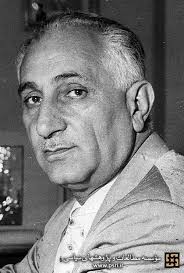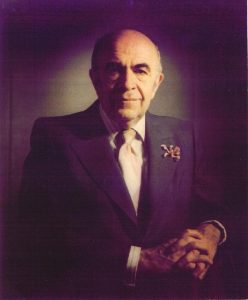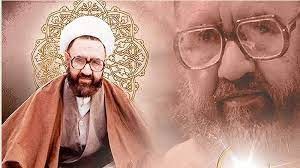By: Mahboubeh Ismaeeli
After Shah and his relatives escaped, one of the Baha’i elements in America called Habib Sabet Pasal entertained Shah and his family providing all facilities. This measures caused more influences between Shah and the Baha’is[1]. Day by day, they were being trusted and paid attention by the regime. The Baha’is themselves confessed they had had a spy in each office in Iran and in all ministries. Once a week, when the provided plans were announced to the king by the government, the reports of the plans were announced to the Baha’i spiritual assemblies.[2]

Habib Sabet Pasal
Although between the years 1342-1344 S.H. the power war between the traditional, political elites who were in favor of the united kingdom and the political elites who were in favor of America was considered to be ended in the failure of political elites who were in favor of England after the power was gained by forces who were in favor of industrial development headed by Hassan Ali Mansour and Amir Abbas Hoveyda, but such challenges and tensions didn’t decrease the Baha’is influence in the court, but the Baha’is tended to people like Hoveyda who was a Baha’i in their political factions. Helped by the English and Americans, the Baha’is provided the facilities to gain power and influence in Pahlavi government for themselves. By Hoveyda’s influence, the gained the power pyramid and made Shah court tend to them in the political faction. The development of the Baha’is in Pahlavi government soared when Amir Abbas Hoveyda as the prime minister of Shah formed its cabinet including many Baha’is. He was known as the Baha’is little headman (of a village) by the Baha’is according to SAVAK documents[3] and was Einul Molk’s offspring. Einul Molk was one of the agents of the ministry of foreign affairs in the first Pahlavi government who played a key role in Reza Khan’s gaining power. For this reason, Muhammad Reza was in debt of Hoveyda and the Baha’is.[4]

Amir Abbas Hoveyda
Hussein Fardoust writes in his diary about the numerous influence of the deviant cult of Baha’ism in all parts of the country during Hoveida’s periods of time. According to him, Ayadi the special physician of Shah made Baha’i ministers to enter into the cabinet as long as he could; so that all high-ranking Iranians in Iran and abroad believe that the real king of Iran was Dr. Ayadi. During his government, the Baha’is gained the important posts and no Baha’i was jobless in Iran[5].
Jawad Mansouri writes in his book a list of military and civil people during the year 1339 S.H. when intelligent service, security, political, cultural, economic professions of the country had been occupied by the Baha’is[6]. Forming extensive organization and planning exactly and holding assemblies, the Baha’is proselytize for their cult and sent representatives to various cities of Iran. This organization was famous as the new-masonry movement in Iran and its center was located at Haifa, Israel. It had been formally recognized by the Zionists attempted by Shoqi Effendi. The Zionistic thoughts have been exploited administering the organization and the Jewish masonry associations which are managing the organization were using David’s themes and poems which are being sung by the Jewish.[7]

Such close bonds between the Zionists and the Baha’is paved the way for Israel’s influence in Iran more and tended Pahlavi regime to the Zionists. Iran was the mere Islamic country to be the base for Zionism in the Middle East opposed by other Islamic countries. Although English influence had been decreased by the influence of America, but Zionism which was one of the cults made by the English in Judaism[8] could enter into Iran supported by the Baha’is and could compensate their power in Iran.
The reaction of clergymen regarding the English and Baha’is relationships

Since Qajar periods of time to late Pahlavi ones, the deviant cult of Baha’ism has played a key role as the agent of Colonialism and has stood as a pressure leverage against Islam and clergymen. Being aware of the nature of the cult and its dependence on Colonialism, the scholars opposed and campaign against it. Scholars like Sheikh Fadhlullah Nouri, Nawwab Safavi, Ayatollah Broujerdi, Ayatollah Falsafi[9], Imam Khomeini and his pupils have known the Baha’is as enemies of Muslims and agents of Colonialism. Like Babis, the Baha’is have entered into the political area having eclectic thoughts and shared the colonial influence and played a role in legitimizing Pahlavi regime. However; contrary to Babism which encountered the scholars depending on Shia philosophy, Mahdism system having religious approach, the Baha’ism focused its aims in masonry assemblies having eclectic thoughts depending on irreligious ones. The aims were as follows:
۱) In the political field: depending on liberalism and reformism,
۲) In the field of ethics: behaving in Deism (believing in God without believing in prophets and the heavenly books) and Zionism,
۳) In cultural field: believing in cosmopolitanism,
۴) In social field: Being bigoted with school values and believing in indulgence.[10]
Master Motahhari was of the clergymen who showed a suitable deploment against the eclectic thoughts of this cult. Writing various books, he confronted such thoughts definitely and put the pure Islam against the eclectic thoughts like Baha’ism depending on the intellectual guardian-jurisprudent movements.

Morteza Motahhari
The later movement was based on cultural and intellectual activities and presented a new paradigm based on which implementing the divine commandments depended on gaining the political power and exercising the government by jurisconcults.[11] Also; as the innovator of the Islamic revolution thought, this movement challenged the eclectic thoughts and harassed the Baha’is as the bullions of Pahlavi regime and made their rudiments and thoughts invalid rejected. Presenting such thoughts by Imam Khomeini’s pupils was accompanied by posing Eyalati & Welayati association bill in 1342 S.H. due to Shah’s regime’s attempts for recognizing the deviant cult of Baha’ism formally.
In this bill, the main policy of Shah was supporting Baha’ism and Zionism to remove Islam and confront against the scholars. The consequence of executing such bill ended in removing Islam from the Constitution as the formal religion of the country and the dominance of anti-Islamic minorities like Baha’ism on the country affairs and the destruction of the Islamic traditions and the moral limits of the community in the equality of men and women rights.[12] However, the plans was neutralized by the on time presence and watchful deployment of the Excellency Imam Khomeini (P.H.) as the source of religious Shia authority and as the successor of Ayatollah Broujerdi. By telegraphs, manifestos and speeches, Imam Khomeini made scholars and people come to scene to confront against the Zionism, Baha’ism and the Pahlavi regime. This was his first victory against the Pahlavi regime:
“The Iranian television was a base for spying for the Jewish. The governments are observing it and confirm. The Muslim nation doesn’t become silent to remove these dangers. If a person becomes silent, he/she will be responsible in the divine presence.[13]”
One of the main reasons for Imam’s opposition against the bill was that the Baha’is had united with the Zionists to strengthen Pahlavi regime’s power and to confront against Islam and the scholars. The Baha’is were active in Iran as the agents of Israel. They were using all facilities of the court, army and the government to serve Israel and against Muslims particularly the Iranian nation; so that the army heads and government obey the Baha’ism organization and Israel agents and didn’t heed the Iranian officials.[14] Also, SAVAK was preventing people’s aids for the people of Palestine and seizing them. SAVAK also dispersed people who were demonstrating against Israel.[15]
Iran was active in favor of the occupiers of Palestine and the Zionistic aggressive.[16]
Such tyrant policies made the scholars determined against Pahlavi regime. The clergymen like Seyyed Abdul Karim Hashemi Nejad launched centers to discuss and criticize Baha’ism and Israel.[17]
Detentions of the scholars, apprehending newspapers, repression of demonstrations, preventing people to help the people of Palestine and allowing the Iranian Zionists to gather money for holding happy assemblies by the Jewish were done by SAVAK.[18]
Jamal Abd Al-Naser, the Egyptian president introduced the Baha’is as the spies of Israel and the office of the secretary general of al-Alam Al-Islamieh boycotted trading with Israel in a manifesto in Mecca on Isfand 1352 S.H. It asked the Islamic countries to boycott the activities of this cult in their countries.[19]
[۱] Jawad Mansouri, the history of 15th of Khordad movement narrated by the documents, p. 326.
[۲] Hussein Tabatabaee, ibid, p. 117
[۳] Ibid.
[۴] The center for investigating the historical documents, Amir Abbas Hoveyda narrated by the documents, p. 10.
[۵] Hussein Fardoust, the emergence and fall of Pahlavi kingdom, Vol. 2, pp. 202-203.
[۶] Jawad Mansouri, ibid, Vol. 1, pp. 1-6.
[۷] Bahram Afrasyabi, ibid, pp. 657-658.
[۸] Refer to Hamid Ahmadi, the roots of crisis in the Middle East, p. 17.
[۹] Ali Dawani, ibid, p. 257.
[۱۰] Hussein Mir, ibid, Vol. 1, p. 35.
[۱۱] Muhammad Shafiee Far, the intellectual rudiments of the Islamic Revolution, p. 325.
[۱۲] Jawad Mansouri, ibid, Vol. 1, p. 231; also refer to Mohsen Milani, forming the Islamic Revolution from Pahlavi kingdom to the Islamic Republic, pp. 107-108 and Abbas Ali Amid Zanjani, the Islamic Revolution of Iran, pp. 132-137.
[۱۳] Sahifeh Noor, Vol. 1, p. 34.
[۱۴] Jawad Mansouri, ibid, Vol. 1, pp. 331-332.
[۱۵] Seyyed Hamid Rowhani, Imam Khomeini’s movement, Vol. 2, p. 33.
[۱۶] Ibid, p. 234.
[۱۷] The center for investigating the historical documents of the ministry of Iranian intelligent service, Imam’s disciples narrated by SAVAK, pp. 216-217.
[۱۸] Seyyed Hamid Rowhani, ibid, Vol. 2, p. 245.
[۱۹] Jawad Mansouri, ibid, p. 329.






